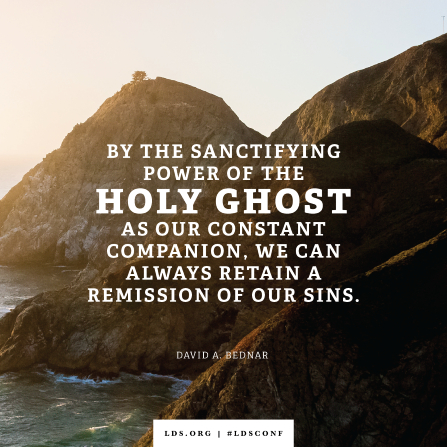3
Nephi 2:19
 Accept
the atonement-Agency
Accept
the atonement-Agency
Because
He loves you, He will find you. He will place you upon His shoulders,
rejoicing. And when He brings you home, He will say to one and all,
“Rejoice with me; for I have found my sheep which was lost.”3
What
19 And
thus ended the fifteenth year, and thus were the people in a state of
many afflictions; and the a of
destruction did hang over them, insomuch that they were about to be
smitten down by it, and this because of their iniquity.
Why
Iniquity brings
destruction. “wicked never was happiness” prophecy is being
fulfilled.
Pattern
Alma
60:29
29
Behold it is time, yea, the time is now at hand, that except ye do
bestir yourselves in the defence of your country and your little
ones, the sword of
justice doth hang over you; yea, and it shall fall upon you and visit
you even to your utter destruction.
Hel.
13:5
5
And he said unto them: Behold, I, Samuel, a Lamanite, do speak the
words of the Lord which he doth put into my heart; and behold he hath
put it into my heart to say unto this people that the sword of
justice hangeth over this people; and four hundred years pass not
away save the sword of justice falleth upon this people.
3 Ne.
3:3
3
And it seemeth a pity unto me, most noble Lachoneus, that ye should
be so foolish and vain as to suppose that ye can stand against so
many brave men who are at my command, who do now at this time stand
in their arms, and do await with great anxiety for the word—Go down
upon the Nephites and destroy them.
Isa.
1:20 (19–20)
19
If ye be willing and obedient,
ye shall eat the good of
the land:
20 But if ye refuse and rebel, ye shall be devoured with the sword: for the mouth of the Lord hath spoken it.
20 But if ye refuse and rebel, ye shall be devoured with the sword: for the mouth of the Lord hath spoken it.
Punish, Punishment
See
also Accountability ; Chastening ; Correction ; Curse ; Damnation ; God,
Justice of ; Hell ; Reproof ;Retribution ; Spirits
in Prison ; Vengeance
Christ
Hebrews 10:29
29
Of how much sorer punishment,
suppose ye, shall he be thought worthy, who hath trodden under foot
the Son of God, and hath counted the blood of the covenant, wherewith
he was sanctified, an unholy thing, and hath done despite unto the
Spirit of grace?
30 For
we know him that hath said, aVengeance belongeth unto
me, I will brecompense,
saith the Lord. And again, The Lord shall cjudge his
people.
Conference
Before
the Crucifixion and afterward, many men have willingly given their
lives in selfless acts of heroism. But none faced what the Christ
endured. Upon Him was the burden of all human transgression, all
human guilt.
And
hanging in the balance was the Atonement. Through His willing act,
mercy and justice could be reconciled, eternal law sustained, and
that mediation achieved without which mortal man could not be
redeemed.
He,
by choice, accepted the penalty for all mankind for the sum total of
all wickedness and depravity; for brutality, immorality, perversion,
and corruption; for addiction; for the killings and torture and
terror—for all of it that ever had been or all that ever would be
enacted upon this earth.
In
choosing, He faced the awesome power of the evil one who was not
confined to flesh nor subject to mortal pain. That was Gethsemane!
How
the Atonement was wrought, we do not know. No mortal watched as evil
turned away and hid in shame before the light of that pure being.
All
wickedness could not quench that light. When what was done was done,
the ransom had been paid. Both death and hell forsook their claim on
all who would repent. Men at last were free. Then every soul who ever
lived could choose to touch that light and be redeemed.
By
this infinite sacrifice, through this atonement of Christ, all
mankind may be saved by obedience to the laws and ordinances of the
gospel.
And
they were restored. In the Book of Mormon the word atone in
form and tense appears fifty-five times. I quote but one verse from
Alma: “And now, the plan of mercy could not be brought about except
an atonement should
be made; therefore God himself atoneth for
the sins of the world, to bring about the plan of mercy, to appease
the demands of justice, that God might be a perfect, just God, and a
merciful God also” (Alma
42:15;
italics added).
Only
once in the New Testament—fifty-five times in the Book of Mormon.
What better witness that the Book of Mormon is indeed another
testament of Jesus Christ?
I
seldom use the word absolute. It
seldom fits. I use it now—twice. Because of the Fall, the Atonement
was absolutely essential for resurrection to proceed and overcome
mortal death.
The
Atonement was absolutely essential for men to cleanse themselves from
sin and overcome the second death, which is the spiritual death,
which is separation from our Father in Heaven. For the scriptures
tell us, seven times they tell us, that no unclean thing may enter
the presence of God.
Those
scriptural words, “Thou mayest choose for thyself, for it is given
unto thee” (Moses
3:17),
introduced Adam and Eve and their posterity to all the risks of
mortality. In mortality men are free to choose, and each choice
begets a consequence. The choice Adam made energized the law of
justice, which required that the penalty for disobedience would be
death.
But
those words spoken at the trial, “Thou couldest have no power at
all against me, except it were given thee from above” (John
19:11),
proved mercy was of equal rank. A redeemer was sent to pay the debt
and set men free. That was the plan.
...I
readily confess that I would find no peace, neither happiness nor
safety, in a world without repentance. I do not know what I should do
if there were no way for me to erase my mistakes. The agony would be
more than I could bear. It may be otherwise with you, but not with
me.
An
atonement was made. Ever and always it offers amnesty from
transgression and from death if we will but repent. Repentance is the
escape clause in it all. Repentance is the key with which we can
unlock the prison from inside. We hold that key within our hands, and
agency is ours to use it.
And
the Passover would be commemorated forever as the sacrament, in which
we renew our covenant of baptism and partake in remembrance of the
body of the Lamb of God and of His blood, which was shed for us.
It
is no small thing that this symbol reappears in the Word of Wisdom.
Beyond the promise that Saints in this generation, who obey, will
receive health and great treasures of knowledge is this: “I, the
Lord, give unto them a promise, that the destroying angel shall pass
by them, as the children of Israel, and not slay them” (D&C
89:21).
I
cannot with composure tell you how I feel about the Atonement. It
touches the deepest emotion of gratitude and obligation. My soul
reaches after Him who wrought it, this Christ, our Savior of whom I
am a witness. I testify of Him. He is our Lord, our Redeemer, our
advocate with the Father. He ransomed us with His blood.
Humbly
I lay claim upon the atonement of Christ. I find no shame in kneeling
down in worship of our Father and His son. For agency is
mine, and this I choose to
do!
Just
as the Good Shepherd finds His lost sheep, if you will only lift up
your heart to the Savior of the world, He will find you.
Because
He loves you, He will find you. He will place you upon His shoulders,
rejoicing. And when He brings you home, He will say to one and all,
“Rejoice with me; for I have found my sheep which was lost.”3
As
we increase in faith, we also must increase in faithfulness. Earlier
I quoted a German author who lamented the destruction of Dresden. He
also penned the phrase “Es gibt nichts Gutes, ausser: Man tut es.”
For those who do not speak the celestial language, this is translated
as “There is nothing good unless you do it.”10
You
and I may speak most eloquently of spiritual things. We may impress
people with our keen intellectual interpretation of religious topics.
We may rhapsodize about religion and “dream of [our] mansion
above.”11 But
if our faith does not change the way we live—if our beliefs do not
influence our daily decisions—our religion is vain, and our faith,
if not dead, is certainly not well and is in danger of eventually
flatlining.12
But
sometimes I think we misunderstand obedience. We may see obedience as
an end in itself, rather than a means to an end. Or we may pound the
metaphorical hammer of obedience against the iron anvil of the
commandments in an effort to shape those we love, through constant
heating and repeated battering, into holier, heavenly matter.
No
doubt about it, there are times when we need a stern call to
repentance. Certainly, there are some who may be reached only in this
manner.
But
perhaps there is a different metaphor that can explain why we obey
the commandments of God. Maybe obedience is not so much the process
of bending, twisting, and pounding our souls into something we are
not. Instead, it is the process by which we discover what we truly
are made of.
We
are created by the Almighty God. He is our Heavenly Father. We are
literally His spirit children. We are made of supernal material most
precious and highly refined, and thus we carry within ourselves the
substance of divinity.
You Are Worthy of Rescue
My
dear brothers and sisters, my dear friends, I testify that God sees
us as we truly are—and He sees us worthy of rescue.
You
may feel that your life is in ruins. You may have sinned. You may be
afraid, angry, grieving, or tortured by doubt. But just as the Good
Shepherd finds His lost sheep, if you will only lift up your heart to
the Savior of the world, He will find you.
If
mortal hands can transform rubble and ruins into a beautiful house of
worship, then we can have confidence and trust that our loving
Heavenly Father can and will rebuild us. His plan is to build us into
something far greater than what we were—far greater than what we
can ever imagine. With each step of faith on the path of
discipleship, we grow into the beings of eternal glory and infinite
joy we were designed to become.
This
is my testimony, my blessing, and my humble prayer in the sacred name
of our Master, in the name of Jesus Christ, amen.
Hymns
children

